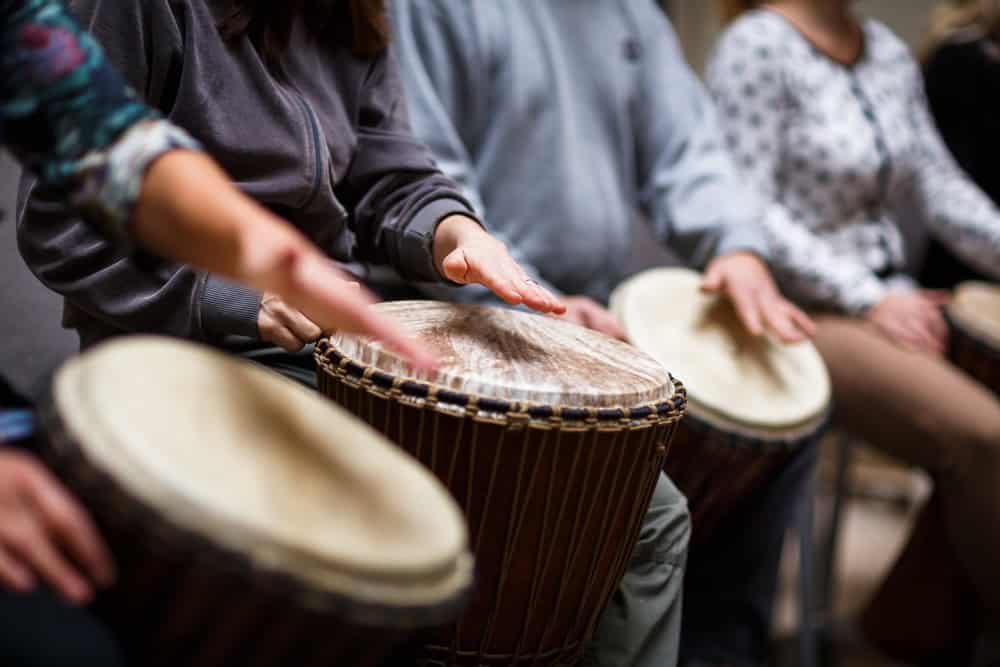
Music therapy has been used for years as an effective therapy for people with a range of mental and substance use disorders. It employs evidence-based musical interventions to address a wide range of challenges, including substance cravings, motivation for treatment, and the emotional turmoil often associated with recovery.
Music therapy in addiction treatment settings involves the skillful use of sound, rhythm, and melody by trained therapists. As the value of this alternative therapy is being explored by experts, treatment providers are finding ways to add this modality to their comprehensive treatment. Some common therapeutic music exercises used in music therapy include:
Music therapy modality recognizes that music has the power to heal, soothe, and inspire, making it a valuable resource in the recovery journey.
In this article, we delve into the methods employed in music therapy, the psychological and emotional benefits it brings, and how it has made a profound difference in the lives of many on their journey to recovery.

Music therapy, a field that employs the power of music as medicine, has emerged as a potent ally in the battle against substance use disorders (SUDs) and addiction. With over 20.4 million people affected by SUDs in the United States alone and hundreds of thousands of drug and alcohol-related deaths every year, the need for effective and holistic healing has never been more critical.
Music therapy offers a harmonious and holistic approach to substance abuse recovery. Its ability to address the emotional, psychological, and physical aspects of addiction makes it a powerful tool in helping individuals overcome the challenges of addiction and work towards lasting sobriety. Here’s a quick look at how music therapy helps in substance abuse recovery:
Many people with addiction issues have difficulty expressing their emotions verbally. Music allows them to convey their feelings, whether it's pain, anger, sadness, or joy, through rhythm, melody, and lyrics. This emotional release can be cathartic and help them cope with the emotional turmoil often associated with recovery.
Samantha, a music therapy beneficiary, says music therapy has helped her see the meanings of the songs and that she loves it because she’s free to talk about how she feels. “I can cry, I can just be myself, and it’s amazing,” she told 10News.
Recovery from addiction can be incredibly stressful. One has to deal with cravings, withdrawal symptoms, and the challenges of rebuilding their lives. Music has a calming effect on the nervous system, reducing stress and anxiety.
Listening to soothing music or engaging in music-making activities can help patients relax, cope with stressors, and stay focused on their recovery goals. 28-year-old Aposporos is a good example of how music helps relieve stress. She started using opiates when she was 8 years old and had been in and out of rehab three times.
Motivation is a critical factor in addiction recovery. Music therapy can boost motivation by helping patients connect with their inner desires and aspirations. Through music, they can explore their strengths, values, and reasons for wanting to overcome addiction. Creating music or engaging in music-based activities can also instill a sense of purpose and commitment to the treatment process.
Addiction often stems from complex underlying issues and triggers. Music therapy encourages self-reflection and insight by prompting individuals to explore their experiences through music. Analyzing song lyrics, writing their own songs, or improvising music can lead to a deeper understanding of their addiction-related behaviors, triggers, and coping mechanisms.
Uplifting songs, motivational lyrics, or musical experiences that create a sense of joy can provide much-needed emotional support. This is especially crucial since recovery is often emotionally taxing.
Group music therapy sessions offer a sense of community and connection among those in recovery. Collaborative music-making activities, like drumming circles or group singing, promote social bonding and a sense of belonging. This support network can be crucial in maintaining long-term sobriety.

There are many methods used in music therapy, each serving a distinct purpose. Music therapists will assess patients to determine the method or combination of methods that will be most effective in helping them achieve their therapeutic objectives.
Compositional music therapy is where the patient and therapist work together to create an original, permanent musical model. It provides a creative outlet for emotional expression, helps clients process their feelings, and fosters a sense of accomplishment when they complete a composition. It can also enhance self-esteem and self-expression.
Improvisation music therapy encourages spontaneous music creation without pre-planned melodies or structures. The patient and therapist engage in musical dialogue, responding to each other's musical cues. This method emphasizes the process of music-making rather than the final product and can promote self-expression, creativity, and emotional release.
Receptive music therapy involves listening to carefully selected pieces of music in a therapeutic context. The therapist chooses music based on the patient's goals and needs. The patient actively listens to the music, paying attention to the emotional and physiological responses it elicits. Receptive music therapy can boost relaxation, reduce stress and anxiety, and help patients connect with their emotions.
Re-creative music therapy focuses on recreating existing music, either by playing or singing songs. Patients learn to play instruments or sing songs they enjoy, or that hold personal significance to them. This therapy enhances musical skills and can be ideal for those who have an affinity for music or a desire to learn an instrument.
Music's power as a medium for healing and transformation is rooted in several underlying principles that contribute to its effectiveness in therapeutic settings. These principles highlight why music holds a unique and profound place in the realm of healing and personal growth:
At More Than Rehab, we believe that healing and transformation extend beyond traditional therapeutic approaches. Music therapy is one of the most powerful recovery tools that complement our comprehensive addiction treatment programs. It instills hope, motivates change, and reminds our clients that recovery is not just about overcoming challenges—it's also about discovering their inner strength and potential. Contact us today to explore our music and sobriety programs or other recovery options.


